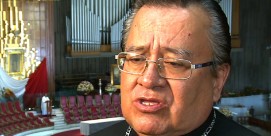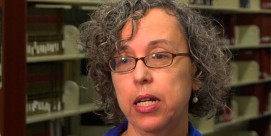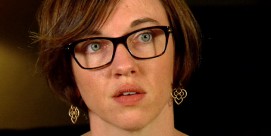In This Episode << SLIDE LEFT TO SEE ADDITIONAL SEGMENTS
Evangelicals and Evangelism
BOB ABERNETHY, anchor: Now, the final part in our series on America’s Evangelicals. Today, “Evangelicals and Evangelism.” Despite their many differences, evangelicals share a common commitment to spread their faith. In our national survey, conducted with U.S. NEWS & WORLD REPORT, 73 percent of all evangelicals told us they have tried to convince someone to accept Jesus. Tens of thousands do that through traditional career missionary efforts overseas, but the vast majority of evangelicals say they do it in their everyday lives. Kim Lawton has our report.
KIM LAWTON: Just over the border from Brownsville, Texas, steady Gulf winds blow across Matamoros, Mexico. In this “colonia” or neighborhood, there’s no running water or electricity, and few have jobs. Mexican Protestants have established a tiny church here: Mision Peniel. A team of evangelicals from Crossroads Community Church in Greenville, South Carolina, has come to help support Mision Peniel and bring in new members. They’re on what’s known as a short-term missions trip — this one only five days long.

In Greenville, Jim Frady designs tires for Michelin. Here, he sees himself as an ambassador for Jesus.
JIM FRADY (Volunteer, Adventure in Missions): I think that God calls us in his word to be his hands and his feet. I feel honored to be the hands and feet of Jesus Christ and just serving these people. I’m just going to be Christ as best as I can represent him.
LAWTON: Rather than making a career missionary commitment, more and more evangelicals are going on short-term trips, from a few days up to a year. This team is working on a variety of projects in the colonia, but they are all motivated by a desire to spread their faith in Jesus. They believe accepting Christ is the only way to salvation.
SHAWN LABELLE (Volunteer, Adventures in Missions): If we really believe that there is a literal heaven and a literal hell, then we believe that we need to at least share that with people and give them the option to know clearly.
LAWTON: In the New Testament Book of Matthew, Jesus tells his followers to go into every nation making disciples and baptizing them in the name of the Father, the Son, and the Holy Spirit. Christians call it the Great Commission. And evangelicals take that very seriously.
The word “evangelical” comes from the Greek word for “gospel” or “good news.” Evangelicals believe the central message of the gospel is that Jesus came to save people from their sins. In our survey, an overwhelming 84 percent of America’s evangelicals said they believe the only hope for salvation is through a personal faith in Jesus Christ, and they want everyone to accept that salvation for themselves.

LUIS PALAU (Evangelist): We should be very happy and we should want everyone to hear it and to accept it, because it’s beautiful, marvelous, life-changing, direction-changing, life-enhancing — it’s the best news in the world. So that’s why evangelicals feel compelled to pass it on.
LAWTON: Today, evangelicals are passing their message on through a vast missionary effort both overseas and at home. Evangelism has become a many-faceted, multibillion-dollar enterprise that uses technology and innovation to reach as many people as possible. Three quarters of America’s evangelicals say they’ve given time or money to help spread the gospel either in the U.S. or overseas. And 63 percent say they talk to others about their belief in Jesus at least once a week.
But it’s an enterprise that is also increasingly controversial in a pluralistic world.
Randall Balmer teaches religious history at Columbia University’s Barnard College and has written widely about evangelicals.
Dr. RANDALL BALMER (Professor, Barnard College, Columbia University): We’re living in a multicultural, religiously pluralistic context, and I think we all have to figure out how to operate within that context. What is right, what is the appropriate form of discourse with someone else? How can I disagree with someone without being disagreeable myself?
LAWTON: For example, is it appropriate to evangelize people who are already baptized Catholics?
Dr. ROSANN CATALANO (Roman Catholic Scholar, Institute for Christian and Jewish Studies): You know, people are free to do as they want, but if the reason for their outreach to other Christians has to do with the fact that they see Christianity in binary terms — either you’re an evangelical Christian or you’re not really a Christian — I would find that offensive.
LAWTON: Rosann Catalano is a Roman Catholic scholar with the Institute for Christian and Jewish Studies in Baltimore. She works with people of other faiths and disputes the core evangelical teaching that Jesus is the only way to salvation.
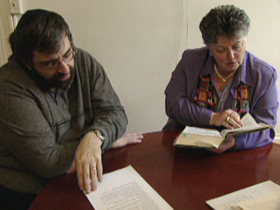
Dr. CATALANO: God speaks to people across our world and across time in a variety of ways, and it seems to me an enormous act of hubris on my part, or pride on my part, to say, “I know the mind of God, and God wants us to come to God only through the path that Jesus provides.”
LAWTON: But the evangelicals on this team are unapologetic in their belief.
Mr. FRADY: The Scripture says, “There’s only one way to come to the Father.” It’s what I believe to be the truth. And so, all I can do is try to express that and tell people that. I don’t want to force it down them. I want them to choose, just like I did. I chose.
LAWTON: They say what’s important is accepting Jesus as one’s personal savior, not church affiliation.
Mr. LABELLE: I think that you can be Catholic and not have a relationship with God. You can be focused more on the hoops to jump through, if you will. I think you can be Baptist or you can be nondenominational and not have a relationship with God.
LAWTON: Professor Balmer says evangelicals have a long history of adjusting their methods to fit the times.
Dr. BALMER: Evangelism’s always changing, and I think that’s the genius of evangelicalism throughout American history, is the way in which evangelicals have adapted to the cultural idiom.
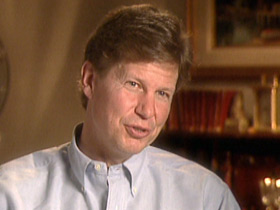
LAWTON: In the 18th century, popular evangelist George Whitefield and his dynamic preaching led America to what was called the Great Awakening. In the 19th century, circuit-riding ministers took the message across the country with western settlers. In the 20th century, preachers such as Billy Sunday and later Billy Graham led mass urban revivals, and many evangelists turned to radio and TV. Now, it’s the Internet.
Bishop T. D. JAKES (The Potter’s House): We didn’t change our message to fit the continuity of technology, but we continued our message through that medium. And it’s exciting to see a whole new genre, a whole new market of people we can reach through this medium.
LAWTON: One of America’s most prominent evangelists, Luis Palau, has adapted his own ministry to better fit contemporary society. The Argentine-born preacher once translated at Billy Graham crusades and then began holding his own crusades. Now he’s changing his format.
Mr. PALAU: We’ve switched from the method that worked during World War II and after World War II, you know, the concept of the campaign, or as Dr. Billy Graham used to call it, a crusade. It was acceptable in those days. We now have what we call festivals. We try to understand the culture.
LAWTON: In spring break 2003, some 200,000 people showed up for Palau’s evangelistic beach festival in Fort Lauderdale. There was lots of contemporary music and dancing — and in the midst of it all, a gospel message.
Mr. PALAU (Preaching at Beachfest): Jesus says to you tonight, “Man, let me come into your heart.” And he wants to do it right now. Right now, right now.
LAWTON: Palau’s ministry has teamed with actor Stephen Baldwin to produce an evangelistic DVD called LIVIN’ IT, which features skateboarding and extreme biking.
STEPHEN BALDWIN (Actor): LIVIN’ IT was simply, how can we take this skate culture and create an outreach tool that is edgy, doesn’t have that cheesy Christian thing that everyone complains about. Let’s make something new, let’s do something really cool.

Really, what my faith and my walk with Christ is all about is sharing that with people, you know.
LAWTON: Baldwin became a born-again Christian in the wake of 9/11, thanks to the evangelizing efforts of both his wife and his housekeeper. Now he also finds himself in the unexpected role of an evangelist.
Mr. BALDWIN: Not to become some guy who’s, like, “Repent!” I’m not that guy. I’m the new guy that is going to bring it to people and, hopefully, bring it to the youth of America in a new way.
LAWTON: Some in the evangelical community worry that such nontraditional methods could compromise the message.
Dr. BALMER: I think a lot of evangelicals are concerned about how the translation of the gospel into the popular idiom has the tendency, or at least the danger, of watering down the gospel itself.
Mr. BALDWIN: The Bible is the word of God. And God’s a pretty powerful guy, you know. He created everything. So I think if he can do that, then he can keep his word exactly how he wants it.
LAWTON: Another born-again actor, Kirk Cameron, takes an aggressive approach to evangelism.
Cameron and New Zealand evangelist Ray Comfort say modern evangelism focuses too much on God’s love and not enough on his judgment. They have a TV show airing on Christian networks that adopts a “hellfire and brimstone” style of preaching that was popular in decades past.
KIRK CAMERON (Actor): When a person understands the horrific consequences of violating God’s law, then they will run to the Savior to escape the wrath to come. And if we’re true and faithful followers of Christ, that’s what we’ll be telling them: that there is wrath to come.
LAWTON: Other evangelicals prefer a more subtle approach.

Mr. LABELLE: There’s a verse that says, “Always be willing to tell the reason for the hope that lies in you, but do it with gentleness and compassion.” I think when you beat anybody over the head, it just gives Christianity a bad name, and a lot of bad stuff has been done in the name of Christianity. I don’t want to contribute to any more of that.
LAWTON: Ninety-seven percent of all evangelicals told us they believe the best way to spread the faith is by setting a good example for others to follow. That’s the philosophy of Adventures in Missions, the evangelical group that organized the short-term missions trip to Mexico.
BILL BRITTON (Adventures in Missions): Because this generation has been lied to by just about everybody, it really requires much more of a demonstration than it does require just a proclamation.
LAWTON: The team from Greenville saw this firsthand. Many had limited Spanish-language skills. They weren’t preaching; they were building houses.
STEVE BEST (Volunteer, Adventures in Missions): It’s hard to communicate with them, so it’s much easier to show them our love to them by doing the work, and in that way we’re showing how Christ also loves them.
LAWTON: Some team members did more direct evangelism as they walked through the colonia and prayed God would lead them to the right people to talk with. They said they tried to first build relationships, then earn the right to talk about faith.
TOM STEINER (Volunteer, Adventures in Missions): We’ve seen just very generous, very giving people, and very loving people and friendly people.
LAWTON (To Mr. Steiner): And they seem very open to what you want to say, or open to talking about God or other issues?
Mr. STEINER: Some were; some weren’t. You kind of get a sense after talking to them that they’re just, you know, wanting [you] to back off, so you do that, you know? We’re not trying to force anything on anybody. It’s just showing Christ’s love. And some people just aren’t ready for it.
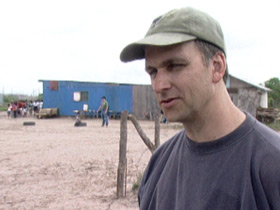
Mr. LABELLE: Does playing soccer with a little boy and encouraging him, and helping along, does that help somebody become a Christian? I’d like to think so. You’re just giving, and you have no idea what the results are. You know, maybe one day in heaven we’ll find out.
LAWTON: Gene Mims, vice president of the Southern Baptist LifeWay Christian Resources, says it is possible to be too subtle in sharing the gospel.
GENE MIMS (Vice President, Southern Baptist LifeWay Christian Resources): We need to share the message as well as live the message. Sometimes, unfortunately, some people share the message without living it, and then sometimes people live the message without sharing it.
LAWTON: LifeWay produces materials to help evangelicals spread their faith.
Mr. MIMS: Evangelism is important, or it wouldn’t be so hard. Everything else in the church is easier than evangelism.
LAWTON: In a chain of bookstores across the country, they sell attention-getting merchandise: T-shirts with catchy slogans, and kitschy items such as the Rubik’s Cube-like “evange-cube.” There are also workbooks and dozens of videos that give simplified tips on presenting the gospel.
Bishop JAKES (Preaching): Give me a radical person who’ll turn the whole joint over and preach the infallible, immutable word of God.
LAWTON: Despite all the energy and activities, evangelical leaders worry about their movement’s long-term commitment to evangelism.
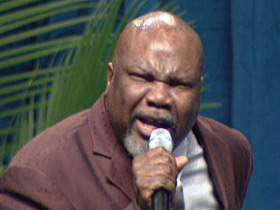
Bishop JAKES: I am concerned that we’re not the soul-winners that we used to be. I think that we’ve become preoccupied with so many other things and perhaps become too reliant on evangelists and ministers to do the job that should be the responsibility of every Christian.
LAWTON: Many also wonder about a possible softening of evangelical beliefs. In our survey, less than half of all evangelicals agreed that only born-again Christians would go to heaven.
Dr. BALMER: If they are forced to kind of turn that around and apply that principle to their neighbors, to their friends and people that they know from school or work, whatever it might be, I think they’re much less willing to say those folks also are condemned to damnation.
LAWTON: Some experts said the number could indicate a broadening evangelical acceptance of other branches of Christianity.
Evangelicals may debate how and when to share the gospel, but they still believe almost unanimously that they should do it, even in a pluralistic world. Ninety percent told us they think it’s important to spread their faith.
Back home in Greenville, the Crossroads missions team reported on their experiences in Mexico to the rest of the congregation. They said they returned with a new enthusiasm to evangelize in every area of their lives.
Mr. STEINER: God brings people across my path every day for a reason, and definitely trying to be more prayerful and aware of those kinds of things and just see how I can be Jesus to somebody I’m meeting every day, or somebody at the grocery store, the gas station, or whatever.
Mr. FRADY: I look at evangelism more now as a process, to be a part of the process — not just to get an answer, to knock on a door and get an answer that you can chalk up a number. I may never see that person actually say, “Yes, I believe.” But I can play a part of the process to get them closer to the point of believing.
LAWTON: I’m Kim Lawton reporting.



